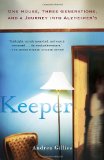Summary | Excerpt | Reading Guide | Reviews | Beyond the Book | Readalikes | Genres & Themes | Author Bio

Critics' Opinion:
Readers' Opinion:
First Published:
Aug 2010, 336 pages
Paperback:
Oct 2011, 336 pages
 Book Reviewed by:
Book Reviewed by:
Donna Chavez
Buy This Book
There are widespread misconceptions about the disease. Uncertainty is the midwife of misconception. The trouble is, nobody knows for sure what triggers Alzheimer's. All we can hope for is that keeping fit, doing crosswords, and eating well will spare us. They don't, necessarily. The illness of writer and philosopher Iris Murdoch attracted so much interest because people were amazed that someone like that could fall prey to Alzheimer's, someone so clever, articulate, affluent. We live in an age- defying, mortality- denying culture. We don't believe in ourselves as elderly. We're interested in cancer and the carcinogenic because those are words that might turn out to apply to the thirty- eight- year- old as much as the seventy- eight- year-old; cancer afflicts the young and rich and fit. If Alzheimer's equals old age, then that's something we'll deal with later . . .though we'll be fine, because we drink soy milk and do Sudoku and play tennis on the weekend. The most widespread misconception is that dementia's a good way to go: "They're in their own little world and pretty happy" the misconception goes, and "they've no idea they're going to die of it right up to the very end, which doesn't sound too bad to me." Very occasionally and exceptionally, in the online Alzheimer's community, sweet- tempered- to- the- last is reported; the slow- fade sweetie who was never any trouble and died smiling in bed before indignity could take hold. But that isn't the norm. That hasn't been Nancy's fate, alas.
If I had to pick one catchall descriptor for Nancy's life in the last few years it would be misery. Profound misery, unceasing and insoluble. She knows that something is wrong, very wrong, but what is it? She's had a series of terrible daily encounters with herself and her environment that might have come directly from an amnesiac thriller: waking to find she has aged fifty years overnight, that her parents have disappeared, that she doesn't know the woman in the mirror, nor the people who claim to be her husband and children, and has never seen the rooms and furnishings that everyone around her claims insistently are her home. Time has slipped, gone seriously askew.
Every day for her is spent in an ongoing quest to put things right. The trouble is, she can't seem to concentrate on the question or on possible clues to it. She can't navigate the problem. When she left us for the nursing home, she was daily engaged in a very protracted, slow- motion form of panic. It's been over eight years now since the formal diagnosis and eleven years at least since symptoms began, but even after all this time, she's only at stage 6 of the disease. Stage 7 looms, the cruelest and last phase, with its loss of continence, motor control, speech, and ability to swallow. Eventually her lungs will forget how to breathe, her heart forget how to beat, and her quest will come to an end.
I have thought, said, and probably even written in here somewhere that Nancy has lost her self. That at least is the impression anyone who knew Nancy twenty years ago would have if they spent a weekend with her. The things that made her herself are all but gone now, I say, but what does it mean to say that? Obviously she is still herself, isn't she? She isn't anyone else. It's just that the self is changed. Disease has changed it, or else, in some vaguely science- fictional manner, overlaid it with something new. But what exactly is the self, anyway? Must it have unity, continuity, in order to be authentic? Does it exist beyond and beneath the health or otherwise of 100,000 million neurons? Is there something else that encapsulates the self, something extra, indefinable, that we call the soul? If, as some philosophers of the mind argue, being conscious can't be said to be without content, that it has to do with being aware of not only your own person but also your past and future, your place in the world, your culture and context, your hopes and fears, then where does that leave Nancy? John Locke may have come up with the notion of "consciousness" specifically to spike Descartes's idea that we are thinking all the time, even when sleeping, but Locke also thought that we are only ourselves in having our memories, and defined personhood accordingly. Locke's definition, being antique, is easy to forgive. It's surprising, though, to find much more recent definitions that agree broadly with his. As late as 1973 an American philosopher named Mary Anne Warren demanded of persons that they be conscious, rational, capable of abstract thought, able to communicate, able to exercise free will, and have self- awareness.
Copyright © 2010 by Andrea Gillies
From the book Keeper by Andrea Gillies, published by Broadway Books, a division of Random House, Inc. Reprinted with permission.





The Funeral Cryer by Wenyan Lu
Debut novelist Wenyan Lu brings us this witty yet profound story about one woman's midlife reawakening in contemporary rural China.
Your guide toexceptional books
BookBrowse seeks out and recommends the best in contemporary fiction and nonfiction—books that not only engage and entertain but also deepen our understanding of ourselves and the world around us.